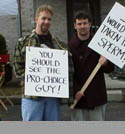Cinema Review
By MICHAEL DEQUINA
Much has been said about Dogma, much of that being negative. For all the talk I had
heard about the allegedly inflammatory content of the religious-themed comedy prior to
seeing it, what shocked me the most were those general accusations that
writer-director Kevin Smith had committed a cinematic act of sacrilege. If you ask me,
there is perhaps no other filmmaker working today who is more serious about his or her
faith than Smith. After all, is there any other filmmaker who has thanked God in the
closing credits of every single one of his films?
That said, after watching Dogma, I can see why people (namely the Catholic League)
have raised some objections. After all, outrageous elements such as dialogue passages
criticizing the Bible's "bad storytelling" and a thread where a cardinal starts a
ridiculous "Catholicism Wow" promotional campaign are bound to raise eyebrows--even
moreso when taken out of context, which is what the film's vocal detractors have done
(and how could they not, given the fact that they haven't seen a frame of the film?).
And context is everything when it comes to Dogma.
Dogma is being billed as "a comic fantasia," and that description should be taken to
its core: it's a comedy; it's a fantasy. As in it's supposed to be taken lightly. And
not in a realistic fashion. As a hilarious typed pre-film disclaimer notes, this
becomes clear within the film's first ten minutes. Smith's wacky plot revolves around
the dastardly scheme of two fallen angels, Loki (Matt Damon) and Bartleby (Ben
Affleck). They discover a loophole in church dogma that will allow them to end their
eternal exile in Wisconsin and reenter the pearly gates of Heaven. The added
consequence, however, is that their success would spell the end of all existence. With
God having been put out of commission while on a holiday, the fate of the world and
all else rests with efforts of a ragtag bunch: Metatron (Alan Rickman), the angel who
serves as the voice of God; Rufus (Chris Rock), the bitter, heretofore unknown 13th
Apostle; heavenly Muse-turned-stripper Serendipity (Salma Hayek); a pair of familiar
Prophets by the name Jay and Silent Bob (Jason Mewes and Smith, reprising their
recurring roles); and the reluctant key figure in thwarting the renegade duo, Bethany
(Linda Fiorentino), an abortion clinic worker who, after a series of rough life
experiences, has lost her faith.
The last sentence points up Dogma's central flaw: overpopulation. In addition to the
aforementioned, also encountered along the way is a demon named Azrael (Jason Lee) and
his trio of hockey stick-wielding henchmen; Cardinal Glick (George Carlin), who
institutes the "Catholicism Wow" campaign; and cameo roles played by familiar faces
such as Janeane Garofalo. Some characters could have easily been jettisoned, namely
Serendipity; while it's always a pleasure to see Hayek on the silver screen, her
character is pretty much just the token female celestial being (or, rather, the token
celestial being with breasts, for those from above have no gender). All the extra
bodies also draw valuable time away from one of the story's more primary concerns,
which is Bethany's winding road to rediscovering her faith; as such, her ultimate
enlightenment doesn't pack the punch that it should.
Much like there are characters that don't quite work, there are also scenes and gags
in Dogma that fall short. Jay and Silent Bob's big entrance is a throwback to the
over-the-top and largely unfunny comic book gags in Mallrats, and there's one
elaborate effects set piece involving a shit demon (yes, you read that right) is a
complete failure. Where Dogma excels, however, is in the area of verbal humor,
arguably Smith's forte. The most memorable moments are all in the written and spoken
word, and the film has more than its share of great dialogue: Rufus' rumination on
Mary and Joseph's sex life and his angry diatribe over being left out of the Bible;
Loki and Bartleby confronting a boardroom full of execs on their wide variety of sins;
and the general byplay between Jay and Silent Bob, and that between the pair and
Bethany.
Along its lighthearted and offbeat comic path, though, Smith does raise (and in a
fairly seamless manner at that) some serious and not-so-serious questions about
Catholic dogma and organized religion in general. By virtue of their definition and
the fact that they're in regards to religion, these questions would understandably
upset religious groups. But what those objectors fail to see that the questions
raised, such as the dangerous differences between "beliefs" and "ideas," are
intelligent ones that would only spring from the mind of someone who takes his or her
faith seriously. Smith isn't labeling anyone or anything as being wrong, rather
offering food for thought.
Aside from the uniformly strong work of the ensemble and Smith's wit and
ever-improving way with the camera (check out all the added action in the
background!), that's what makes Dogma a cut above most other comedies: the audacity to
challenge the very audience that comes in for all the penis and flatulence jokes (and
no, they're not in short supply). A lot of people will walk out of Dogma thinking back
on its many laughs, but just as many, if not more, will come out reflecting on their
own religious faith--people who, on any other given day, would probably not give the
issue a single thought. And if that's not an act of piety--as opposed to one of
blasphemy, with which Smith has been so unjustly charged--then I don't know what is.
Also be sure to check out Mr. Brown's Movie Site (http://welcome.to/mrbrown); CinemaReview Magazine
(http://www.cinemareview.com), and The Eyepiece Network
(http://www.eyepiece.com)
Back to Dogma Press...

































